Understanding Jeremiah 27:20
Jeremiah 27:20 states, "Which Nebuchadnezzar king of Babylon took not, when he carried away captive Jeconiah the son of Jehoiakim king of Judah, and the princes of Judah, with the craftsmen and the smiths from Jerusalem, and brought them to Babylon." This verse reflects a significant moment in the history of Israel, especially in relation to Babylon's conquest and the exile of Jerusalem's elite.
Context and Historical Background
This passage is set during the Babylonian invasion when King Nebuchadnezzar captured Jerusalem. The mention of Jeconiah (also known as Jehoiachin) highlights the royal lineage that was affected by these events. The commentaries by Matthew Henry, Albert Barnes, and Adam Clarke provide essential insights into the implications of this scripture, emphasizing God's sovereign control over nations and His judgments.
Commentary Insights
Matthew Henry’s Commentary
Matthew Henry notes that this verse illustrates God’s judgment upon Judah for their disobedience. He emphasizes that the captivity was not merely a military defeat but a divine punishment, and it serves as a reminder of God’s authority over human affairs.
Albert Barnes’ Notes
Albert Barnes provides a detailed analysis of the cultural and political ramifications of the Babylonian exile. He suggests that the craftsmen and smiths taken to Babylon were essential for the rebuilding of that empire, thereby showing the strategic foresight of Nebuchadnezzar.
Adam Clarke’s Commentary
Adam Clarke points out the prophetic significance of the verse. He sees this event as a fulfillment of Jeremiah's prophecies regarding the impending judgment on Judah and the necessity for the chosen people to return to their covenant with God post-exile.
Bible Verse Cross-References
Jeremiah 27:20 connects with several other scriptures that can deepen our understanding of its themes. Here are 10 key cross-references:
- 2 Kings 24:15-16 - Details the exile of Jeconiah and the taking of captives.
- Jeremiah 25:11-12 - Prophecy about the Babylonian captivity of Judah for seventy years.
- Daniel 1:1-2 - Discusses Nebuchadnezzar’s siege of Jerusalem and the carrying away of captives.
- Jeremiah 29:10 - Contains the promise of restoration after seventy years.
- Isaiah 39:6-7 - Foretells the captivity of the Israelites into Babylon.
- Lamentations 5:1-2 - A cry for mercy from the exiled people.
- Zechariah 1:12 - References God’s anger towards nations that helped in the disaster.
- Ezekiel 12:13 - Prophecy concerning those taking away the captives.
- Romans 11:26-27 - The future restoration of Israel is alluded to in the New Testament.
- Acts 7:43 - Stephen refers to the captivity in a broader context of Israel's history.
Thematic Connections
Thematically, Jeremiah 27:20 engages with the broader biblical narrative of exile, judgment, and eventual restoration. Such events reflect God’s plan and purpose—not only for Judah but within the larger context of His covenant promises.
Tools for Bible Cross-Referencing
To deepen one's understanding of scripture like Jeremiah 27:20, engaging with Bible concordances and cross-reference guides can yield rich insights. Employing a Bible cross-reference system can show connections between Bible verses, aiding in a deeper, thematic Bible verse analysis.
Practical Steps for Cross-Referencing
Individuals seeking to uncover how to find cross-references in the Bible may apply the following methods:
- Utilize printed or digital Bible concordance for thematic analyses.
- Explore study Bibles that provide Bible chain references in the margins.
- Review Biblical commentaries that outline cross-referencing Bible study methods.
- Engage in community Bible studies focusing on Bible verses related to specific themes.
- Use mobile apps designed for an interactive Bible cross-reference guide.
Conclusion
Jeremiah 27:20 serves as a pivotal verse within the context of the Israelite exile. By cross-referencing this passage with its related verses, readers can gain a comprehensive view of God’s redemptive plan that encompasses judgment, exile, and ultimate restoration. The task of understanding scripture is invaluable for personal study or sermon preparation, allowing for enriched insights into inter-Biblical dialogue and the scriptural cross-referencing of key themes throughout the Bible.







